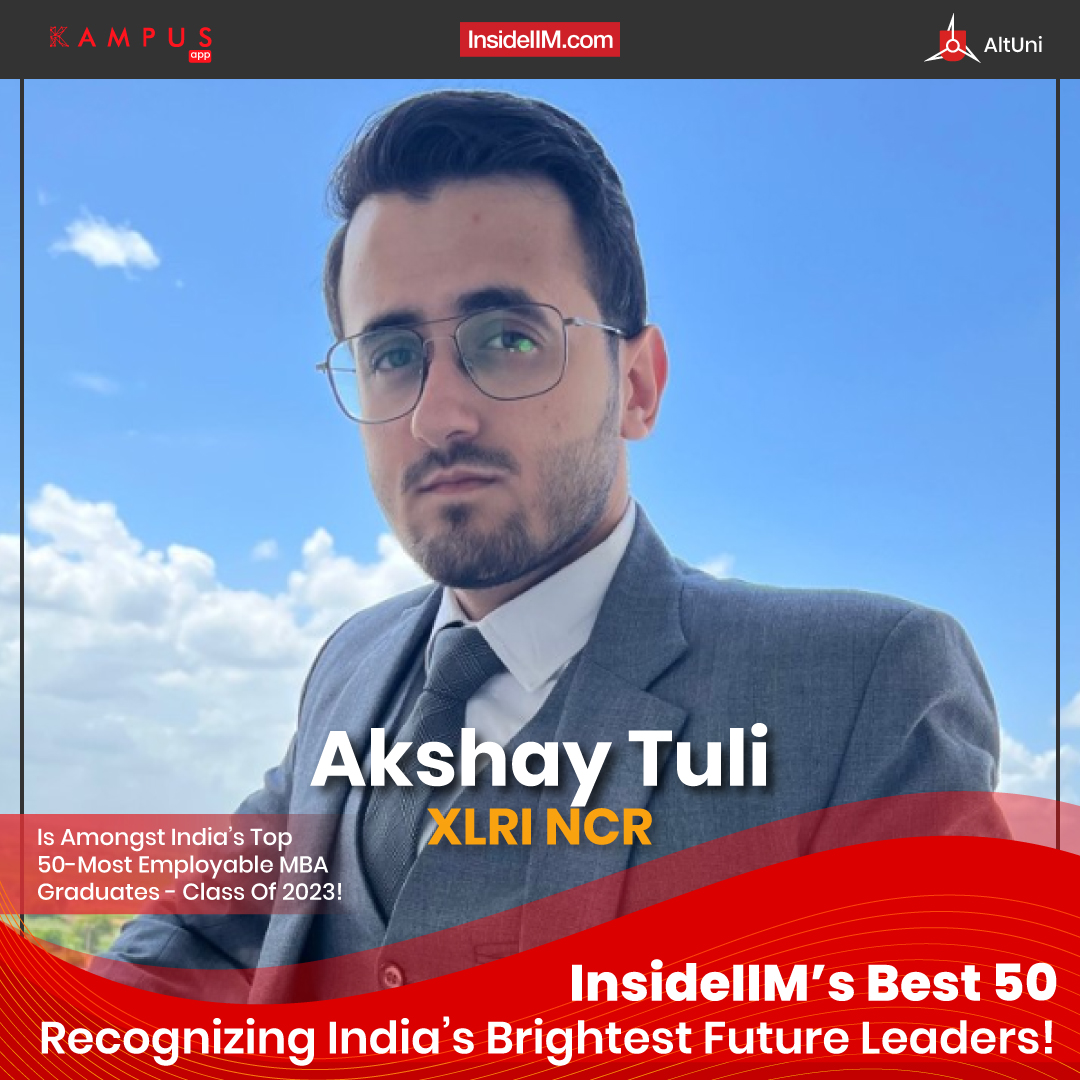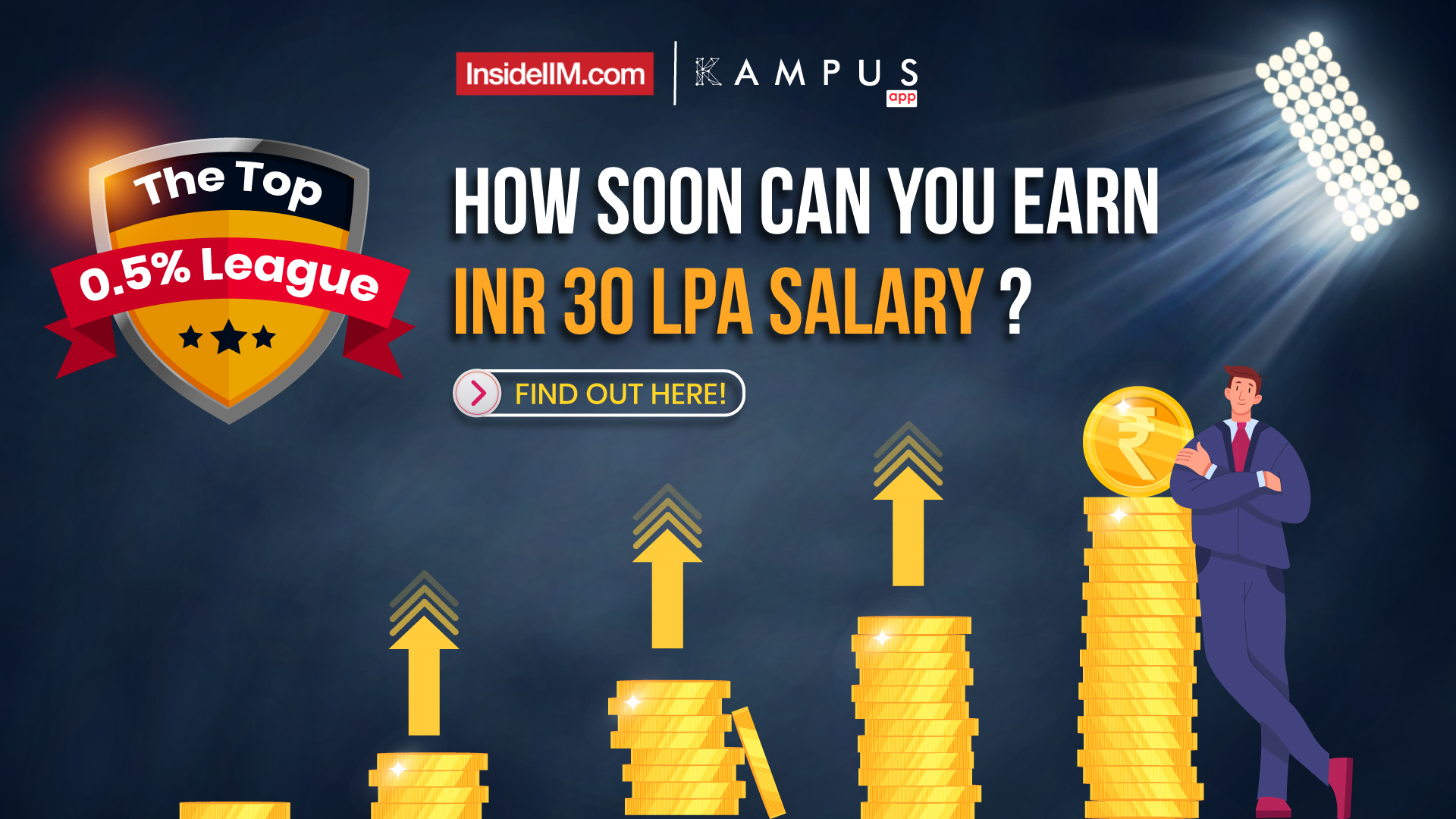In our list of India's Best 50 - the 50 Most Employable Students from the Class of 2021-23, we feature MBA students who have walked that extra mile and done that little more to stand out! One of those featured in today's story, Akshay Tuli, has shown an incredible amount of passion to achieve his true potential. Read on and find out his story!

The following are Akshay Tuli’s set of responses to a questionnaire floated amongst MBA graduates to determine the top 50 Most Employable MBA Graduates of the Class of 2023. Amongst the massive number of entries and responses being evaluated, Akshay's story and profile stood out. Here's his story in his own words.
Have you ever considered how much time it would take for you to be amongst the top 0.5% earners in India? Find out here!
Name an instance where you wanted something and went out of your comfort zone to achieve it OR Tell us the biggest risk you have taken so far in your life.
Like every fresh college graduate, I had some plans for my career in the future work for a few years, gain experience, and get admitted to a B-school in one of the Ivy League universities. These plans, however, were sent for a toss with the onset of the pandemic. Being in the hospitality industry, which was the worst hit only after aviation, my campus placement offers stood revoked. I spent the next few months taking online courses and pursuing several internships to widen my skillset. In parallel, I had to improvise and started applying to B-schools in India for several reasons. This was never a part of my plan, but the exposure I gained working with start-ups was unmatched, and I felt that I was ready for formal business education. Eventually, as things began to smoothen out, I started working in a Fortune 500 company, where I saw promising growth. A few months later, I got into XLRI, and now one of the most challenging decisions stood before me whether to continue my job where I saw significant growth prospects or to completely deviate from my original plan and go for an MBA in India. I weighed in a lot of factors and consulted my mentors, and after a lot of careful thinking, I decided to pursue my MBA from XLRI. Looking back now, I am on a different route than I had imagined. Still, I thank myself for stepping out of my comfort zone when things got tough because it is the upskilling and the time and energy I invested in myself that helped open doors for me even in the toughest of times.
When was the last time someone relied on you? OR What did you do which was purely for someone else - a truly selfless act?
This is a situation from my experience at ITC Hotels - the preferred residence of heads-of-states and celebrities. During my stint, I was rotated among all operating departments, one of which was severely short-staffed due to unavoidable circumstances. Being the festive season, the workload was tremendous, with an unequal distribution of tasks creating undue pressure on the team. Consequently, I found some of my seniors doing double shifts to stay on schedule and taking on unexpected responsibilities. This inspired me to follow their lead and help reduce the burden on the team, but my daily tasks were already very exhausting. Besides, I was already contributing more than what was expected of us as interns or mentioned in our job description. This led me into an ethical dilemma. However, keeping the organization and the learning aspect first, I started performing double shifts, which was not expected from an intern. I learnt operational processes from my supervisors and relieved them from tasks that I could fulfil so that they could take care of more complex responsibilities. My seniors noted my helpful behaviour and made sure that I learnt the processes effectively, even during the busiest times. My fellow interns were motivated by my initiating behaviour and volunteered to take on extra responsibilities as well. This situation impacted me because I had more tasks and the responsibility to execute them while maintaining the performance standards; I also made good cross-boundary relations. The impact on my seniors was that there now existed an equitable distribution of work, which boosted their morale. I was also appreciated by the Corporate team for my resourcefulness.
Tell us about a time when you disagreed with an opinion/idea/decision. What did you do about it?
This instance is of the time while I was working on a high-impact and high-visibility project in a well-established corporate. I was the Project Leader and was working under the mentorship of the national head of the business team. A few weeks before launch, I had to present my project to one of the companys most significant stakeholders who outrightly disagreed with my forecast and projections and instead asked me to scale for a much higher number in terms of revenue and reconfigure segmentation. While my team and I had already gone through projections in optimistic and pessimistic scenarios several times, we know at the moment that even an optimistic scenario would not allow us to achieve the said number. I could see a similar reaction on my mentors face. Still, he too knew that it was better to discuss this with the stakeholder at a later stage, rather than outrightly disappoint him and so I agreed with him diplomatically. A few days later, I developed a formal model as per the stakeholders recommendations which helped me point out the exact problems in a much clearer fashion to him and shared my insights. While he could understand the situation much better now, I retained some insights from his experience and deployed those in the actual project, which was a successful launch. My central learning from this experience was that it was much more practical to handle the situation diplomatically and derive learnings out of someone's experience rather than to hurt their ego and dismay their suggestions outrightly.
What is the one thing you can claim to have some level of expertise or depth of knowledge in - it could be anything - a subject, a sport, a hobby, a venture, an initiative that has led you to do deep work in that field?
Something that I am deeply passionate about is public speaking. Since school, I have actively participated in public speaking events and won numerous accolades for the same. I have improved my speaking and communication abilities and my ability to absorb knowledge from those who are more skilled than I am. When I was pursuing my graduation from the country's top-ranked hospitality management institute, there was a robust collection of events that I could participate in. I was (and still am) an active drama enthusiast. I have performed 30+ shows/theatrical events as the President of the Dramatic Society during my graduation, something I still carry with me at XLRI. The larger chunk of these extra-curricular activities was under the leadership of government dignitaries, pushing me to step outside of my comfort zone and interact with various people. Having worked with global hotel chains where interactions with owners and Vice Presidents were an everyday task, professionalism wasnt a choice but a prerequisite. As I move up the ladder in my career, I further realize the importance of having a pleasant personality, professionalism, and good communication skills.
If 10 Million Dollars (approximately INR 75 Crores) is given to you to use it any way you deem fit what would you do with this corpus?
Growing up, I was always taught about the value of money and that materialism is not true satisfaction. A quote that I find rather interesting is: A wise person should have money in their head, but not in their heart. - Jonathan Swift.1. I would use a chunk of the money to make immediate improvements in the lives of my parents and immediate family. This would include health, lifestyle, and quality of life upgrades. I would also use it for personal upskilling and acquiring new skills and knowledge.2. Over the course of my graduation followed by my tenure at XLRI, I have gathered a few business ideas and the required expertise to execute them. Now that I have the funds too, I would like to invest some amount in the same and experiment with these business ideas.3. I have several philanthropic initiatives in my mind that I wish to take forward. I wish to establish a non-profit organization that will assist underprivileged children in acquiring quality education and pursuing their passions. I will also set up animal shelters to rescue stray and abandoned animals.4. Lastly, I would like to invest the remainder into diverse low-risk portfolios, and let compounding do its magic. After all, money saved is money earned.
***
As per government tax payers' data and our assessment, only about 6,00,000 Indian taxpayers earn an annual 'salaried' income of INR 30 lacs or above. And only 11,00,000 Indian taxpayers earn a 'total' income of INR 30 lacs or more.
Have you ever considered how much time it would take for you to be amongst these top 0.5% earners in India? Find out here!

